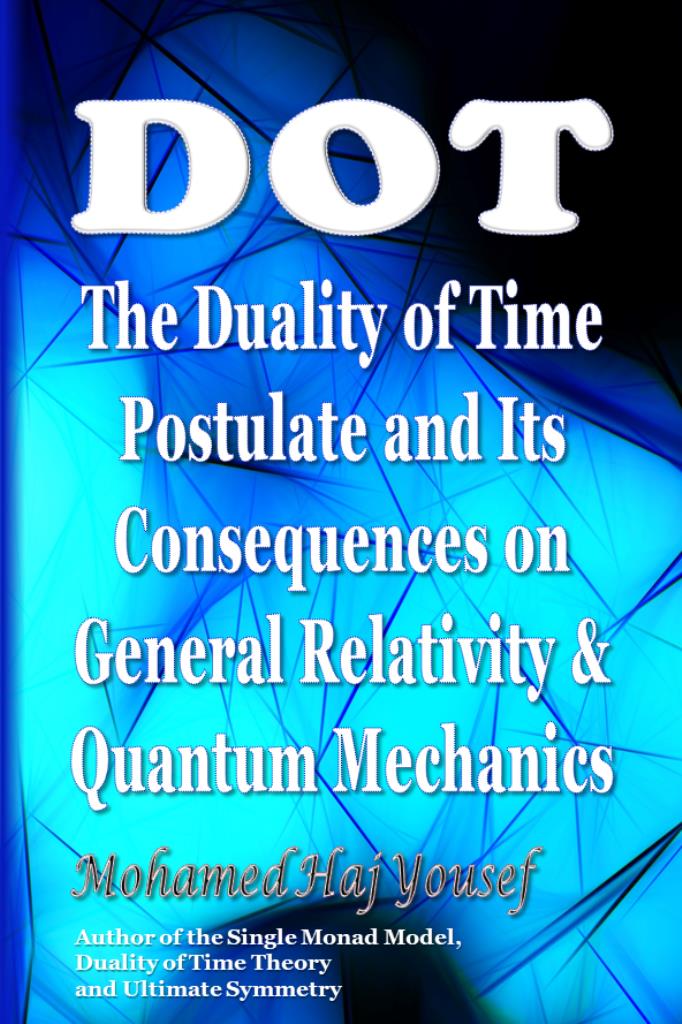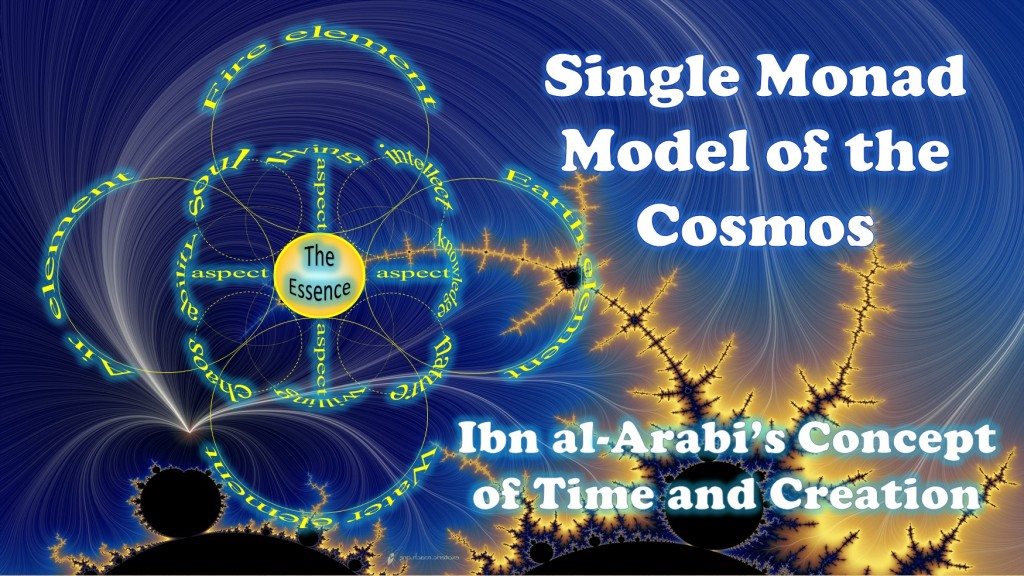Most of these introductory articles are exracted from Volume I of the Single Monad Model of the Cosmos: Ibn al-Arabi's View of Time and Creation... more on this can be found here.
Space-Time and Creation in Six Days
So this means that we - along with all of manifest creation, at all times - are now living in this 'Seventh Day', but the riddle is how we can at the same time still be viewing the other Days of the week, including Saturday itself? Ibn al-Arabi himself remarks that 'it is rather amazing that the Days, among which is Saturday, are (all) happening in Saturday; because it is one of these Days and they are appearing in it' [II.444.7]. But he says that this is ultimately plausible, and he gives the striking example from the famous divine saying describing Adam when Allah showed him his progeny, including himself, in His Hand - while at the same time he was outside looking on at that [II.444.14; Kanz: 15123].
The fact that Saturday is the 'Day of eternity' suggests that the time that we live is only Saturday, so that the other six Days (of events) of the (original) Week could account for space, and not time; this is also supported by the observation that the usual word for 'day' in Arabic (yawm) also bears the meaning of 'direction'.[1] If we add this to what we have just said above about the oneness of being, and that the act of creation 'in one Week' actually takes place at every moment of time, then we can easily come to a very important conclusion that the actual Week and its seven distinctive Days is itself a unit of space-time, and not time alone. In the first six Days, space is created with its six directions (three dimensions) and then it is displayed ('in time') on Saturday. We do not feel the creation in the six Days because we are being created but not yet, and we only feel ourselves created on Saturday, which is why it is the Day of eternity. As Allah said in Qur’an: I called them not to witness the creation of Heavens and the earth (18:51), which He created in six Days, from Sunday to Friday. But when this initial stage of creation is over and Allah the All-Merciful 'mounted on the Throne', changing the creation from one state into another, then and only then, on Saturday, do we realize ourselves and also realize the world (of space) that was created in those preceding six Days.
Ibn al-Arabi declares in many passages that the world is constantly being re-created on every single 'Day of event' (see section V.6). And the Days of events are seven, based on the central divine Attributes of Allah. So the creation of the world by Allah is a seven-step process: in each Day of those seven Days of events the world gains the qualities and manifestations of the corresponding divine Attribute. Thus on the First Day, the world (which had already been determined eternally in the fore-knowledge of Allah) hears Allah's command: 'Be', so it moves from the 'absolute Unseen' into the first step of existence which has no dimension yet (0-D), like the geometrical point (nuqta); it is the first real Image of the Real (al-Haqq), Allah, the Exalted, and thus it is called 'the real through whom creation takes place' (SDK: 132), and this is the 'Greatest Element' (see sections VI.2 and VI.5). So 'the Real' is a name of Allah and this Greatest Element. Then, on the Second Day, the world becomes living, and by that the creation of angels from the divine Light takes place (1-D), as will be discussed in more detail in section VII.10. Then on the Third Day it can witness its Creator (with respect to its being His creation), while on the Fourth Day it becomes willing to magnify[2] its Creator (and by that the creation of the jinn takes place), and on the Fifth Day it is able to do so. Finally, on Friday - or by the 'last three hours' of Friday, when the Human Being is created[3] - , the world will actually know its Creator (again with respect to His act of creation, not in Himself): and this happens only by creating the Human Being (Adam), who is in respect to the world like the Spirit is for the true Human Being [I.118.8, III.363.3].
By these six Days the world is completely created as a Single Monad who is also the 'Complete Human Being', including heavens and earth, mind and soul, spirit and body. Then on the seventh Day this picture of the complete world will be held in the imagination of the human being, because it is an imaginal form that will intrinsically cease to exist right in the second moment ('Day') after its creation, to be instantly re-created in a new form. That is why, Ibn al-Arabi explains, Allah appointed as the 'rulers' on Saturday the essential qualities of coldness and dryness, so that this cosmic image may appear to be continuous [I.61.15]. So our imagination holds a new picture of the world, every 'Day' (moment), and by comparing between those succeeding pictures, the imagination perceives the motion or change in space and time, since Allah never manifests in the same form twice or to two perceivers [I.679.7, II.77.27, II.616.3]. This is also the meaning of the verse: each Day He is in a (different) task (55:29), which Ibn al-Arabi uses more frequently than any others from Qur’an to corroborate this particular ontological view.
It has to be noticed however, that in every Week of Creation, only one 'point' of space-time is created, and that is the point where the observer is - or rather, the observer himself is also created at that point in space-time. The observer perceives other points of space and time because they have been held somehow within the 'Dust' (haba’) of the divine cosmic Imagination (barzakh, khayal, etc.).
Therefore, Ibn al-Arabi explains the verse in Qur’an: Your Lord is Allah Who created the heavens and the earth in six Days, then He mounted on the Throne; He draweth the night as a veil over the Day (7:54, see also other similar verses in Qur'an: 10:3, 11:7, 25:59, 32:4, 50:38 and 57:4) as indicating that the creation has been completed in six Days, from Sunday to Friday, by creating Adam (the cosmic Human Being) on Friday; and then 'He established Himself on the Throne' on Saturday when nothing new is to be created, but only changing the states of the creatures - until the Day of Judgment, and after that either in the Gardens or in Gehenna - so this is the Day of eternity. Yet the heavens and the earth are constantly being re-created every moment: therefore the same Week and Days of creation, including Saturday, are continually reiterating throughout Saturday, at every moment.
So if we think of the whole of manifest creation (the cosmos or 'world') throughout all places and times, throughout 'the Age' (al-Dahr), it is only seven Days: six Days for the creation, and the seventh Day (Saturday) for the realization. But if we think of ourselves as points in this space-time of the Age, because of the eternally renewed re-creation we observe succeeding Days and Weeks (as moments); yet all those Days (including Saturday) are happening in the Saturday of the single, unique Week of 'the Age'.
Ibn al-Arabi draws interesting symbolic parallels and extrapolations from this concept of creation just explained. Just like this momentary creation in the Week, our own human age (life) is also seven days (or periods): six in this world and Saturday for the hereafter, which we have either as all-day in Paradise, or as all-night in Gehenna. Similarly also, the age of human civilization on earth is seven days and we are now living in Friday, indeed in the last few hours of it. This is because, as Ibn al-Arabi observes:
We (the true followers of the Prophet) are, thanks to Allah, the Day of Jum‘a, and Muhammad - may Allah have peace and mercy upon him - is this very 'Hour' itself, by which the Day of Jum‘a takes precedence over all other Days.
[I.646.15]
This is because Muhammad is the Perfect Human Being who is the most perfect Image of the Real. Ibn al-Arabi explains this well-known central conception in his thought in more detail in chapter 346 of the Futuhat, where he observes that Muhammed, in relation to the whole world (cosmos), like the spirit (al-nafs al-natiqa) for each human being, while other prophets are like other spiritual faculties [III.186.31] (see also Table III.1). Then he indicates that the world before the appearance of Prophet Muhammad was like a fetus in the womb of the mother [III.187.6], and that after the passing-away of Muhammed the world is like a sleeping - not dead - person [III.187.1], until in the next world, all the world shall 'live' (have real life and awakening) through the full appearance of Muhammed in his complete composition [III.187.8]. Thus he goes on to note that people in the Gardens and Gehenna are like the different (spiritual and material) parts of the earthly human being, where the people of Gehenna are like the relatively life-less (yet not completely dead) hair and nails [III.187.10]. So in this way the world is a like an 'immense human being' (insan kabir), while the fully human being is like a microcosm (alam saghir).[4]
Many earlier Muslim theologians have tried to explain that Allah did not mean by the Qur’anic references to the 'Days' of creation those same earthly days that we live in, because they claimed that the sort of days that we know could not be existing yet, prior to the completion of creation. In contrast, Ibn al-Arabi stresses that those 'Days' of creation in reality coincide with these same observed and experienced days. At the same time, he also acknowledged that this (cosmic) 'Day' existed before the creation of the heavens and the earth, while the (earthly, observed alternation of) daytime and night-time were only determined afterwards by the creation of the sun.
On another level, Ibn al-Arabi's complex, unique interpretation of those many verses in the Qur’an (and the Bible) that talk about the creation in six Days is promising in terms of modern astronomy and cosmology, because it suggests the first real unification between space and time, as well as a sense in which the 'Week' may have a very important, and not simply conventional, real significance.
However, there are still some further issues that need to be settled in order to understand the meaning of the Week, its movement through the signs of the zodiac, and its detailed role in the process or stages of creation. We shall devote Chapter IV to explaining Ibn al-Arabi's complicated theory of the 'Actual Flow of Time' and Chapter VI to outlining a complete model of the cosmos based on Ibn al-Arabi's unique view of time and his theory of the oneness of being, which will be discussed in Chapter V.
==========
[1] See A. Kashani's well-known 'Tafsir Ibn al-Arabi', published by many publishers, for example: (Beirut: Dar Sadir, 2002), vol. I: 245, vol. II: 571.
[2] This English word here fits very well in this meaning for the Arabic word 'yusabbihu' (n. tasbih: magnification) and probably conveys the meaning here more clearly than the more abstract Arabic word; because at the end the process of creation, according to Ibn al-Arabi's view, is a 'multiplication' of the Oneness of Allah, and a 'magnification' (manifestation) of His 'absolute Unseen' dimension (al-ghayb al-mutlaq). This magnification started with the creation of Angels, and then proceeded with the creation of the jinn who were given extra privilege and duties, because they are commissioned servants, while the perfection (of the theomorphic Image) was only given fully to the (perfect) Human Being (insan) who is the Khalifa (the 'vice-gerent' of Allah).
[3] This was mentioned in one long hadith which describes the sequence of creation according to week days [see: al-Mustadrak ‘ala al-Sahihayn by Mohamed al-Nisaburi (Dar Al-Kutub Al-‘Ilmiyya: Beirut, n.d), vol. II: 593, #3996/7]. See also section VII.10.
[4] Ibn al-Arabi indicates in many places that both the world and the Perfect Human Being work in the same way, which is why he calls the world the 'Great Human Being' (al-insan al-kabir) and the Human Being the 'microcosm' (al-‘alam al-saghir) [III.11.18]. See also: Al-Mu‘jam Al-Sufi: 168-70, and SPK: pp. 4, 16, 30, 107, 136, 276, 282, 297, and also SDG: 6, 8, 28, 35, 37, 175, 189, 259, 264, 274, 288, 332, 339, 348, 360-3. See also section III.2 above for more analogies between the creation of the world and embryology.
... Space Transcendence Read this short concise exploration of the Duality of Time Postulate: DoT: The Duality of Time Postulate and Its Consequences on General Relativity and Quantum Mechanics ...
... the verse in Qur’an: Your Lord is Allah Who created the heavens and the earth in six Days, then He mounted on the Throne; He draweth the night as a veil over the Day (7:54, see also other SIMILAR VERSES in Qur'an: 10:3, 11:7, 25:59, 32:4, 50:38 and 57:4) as indicating that the creation h ...
... an imaginal form that will intrinsically cease to exist right in the second moment ('Day') after its creation, to be instantly re-created in a new form. That is why, Ibn al-Arabi explains, Allah appointed as the 'rulers' on Saturday the essential qualities of coldness and dryness, so that ...
... mercy upon him - is this very 'Hour' itself, by which the Day of Jum‘a takes precedence over all other Days. [I.646.15] This is because Muhammad is the Perfect Human Being who is the most perfect Image of the Real. Ibn al-Arabi explains this well-known central conception in his thought i ...
... arth, mind and soul, spirit and body. Then on the seventh Day this picture of the complete world will be held in the imagination of the human being, because it is an imaginal form that will INTRINSICALLY CEASE to exist right in the second moment ('Day') after its creation, to be instantly ...
... ivine Light takes place (1-D), as will be discussed in more detail in section VII.10. Then on the Third Day it can witness its Creator (with respect to its being His creation), while on the Fourth Day it becomes willing to magnify[2] its Creator (and by that the creation of the jinn takes ...
... l) happening in Saturday; because it is one of these Days and they are appearing in it' [II.444.7]. But he says that this is ultimately plausible, and he gives the striking example from the FAMOUS DIVINE saying describing Adam when Allah showed him his progeny, including himself, in His Ha ...
... 3]. This is also the meaning of the verse: each Day He is in a (different) task (55:29), which Ibn al-Arabi uses more frequently than any others from Qur’an to corroborate this particular ONTOLOGICAL VIEW . It has to be noticed however, that in every Week of Creation, only one 'point' of ...
... sed in Chapter V. ========== [1] See A. Kashani's well-known 'Tafsir Ibn al-Arabi', published by many publishers, for example: (Beirut: Dar Sadir, 2002), vol. I: 245, vol. II: 571. [2] This English word here fits very well in this meaning for the Arabic word 'yusabbihu' (n. tasbih: magnifi ...
... f the mother [III.187.6], and that after the passing-away of Muhammed the world is like a sleeping - not dead - person [III.187.1], until in the next world, all the world shall 'live' (have REAL LIFE and awakening) through the full appearance of Muhammed in his complete composition [III.18 ...
... ople of Gehenna are like the relatively life-less (yet not completely dead) hair and nails [III.187.10]. So in this way the world is a like an 'immense human being' (insan kabir), while the FULLY HUMAN being is like a microcosm (alam saghir).[4] Many earlier Muslim theologians have tried t ...
... n fully to the (perfect) Human Being (insan) who is the Khalifa (the 'vice-gerent' of Allah). [3] This was mentioned in one long hadith which describes the sequence of creation according to WEEK DAYS [see: al-Mustadrak ‘ala al-Sahihayn by Mohamed al-Nisaburi (Dar Al-Kutub Al-‘Ilmiyya: ...














